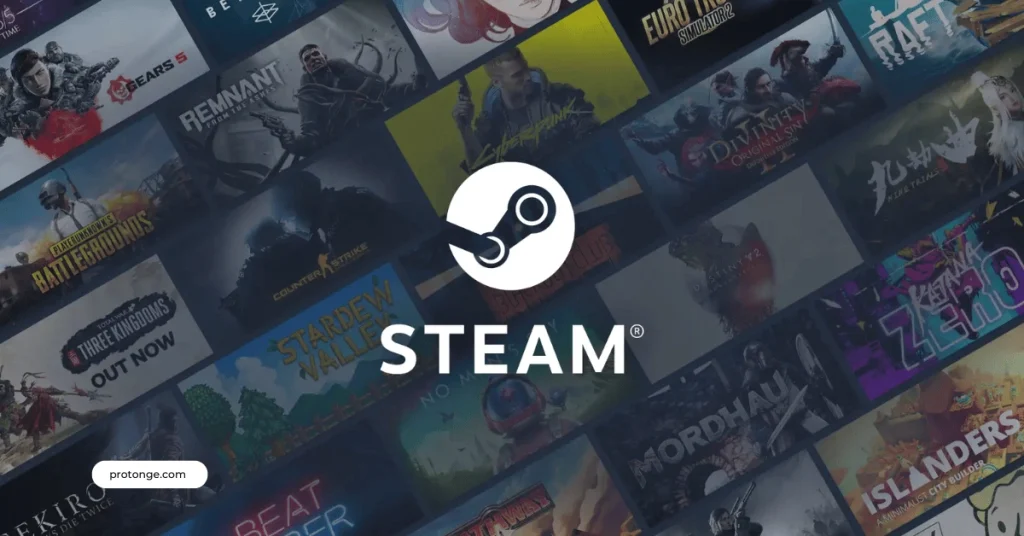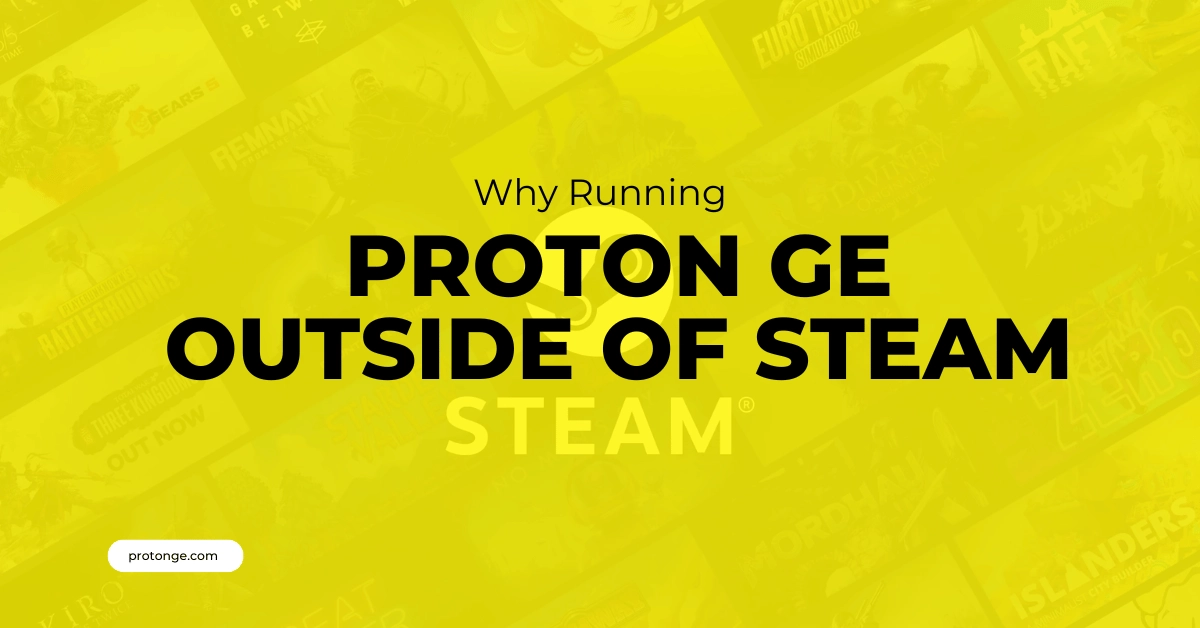Table of Contents
ToggleIntroduction
Proton GE is a powerful tool for playing Windows games on Linux through Steam’s Proton compatibility layer. However, it’s essential to understand that Running Proton GE Outside of Steam is explicitly designed to work within the Steam environment.
While attempting to run it outside of Steam might seem tempting, it’s generally not recommended and can lead to issues.
This guide will explain why Running Proton GE Outside of Steam is unsupported and explore alternative solutions for your needs.
Why Running Proton GE Outside Steam is a Recipe for Trouble
While the allure of running games outside of Steam with Running Proton GE Outside of Steam might be strong, there are several key reasons why it’s not supported and can cause more problems than it solves. Let’s delve deeper into the technical aspects:

1. Designed for a Containerized Environment:
Running Proton GE Outside of Steam operates within a specifically designed container environment inside Steam. This container includes a customized runtime environment and a curated set of libraries. These libraries are chosen and built to work seamlessly together, ensuring compatibility and stability for running Windows games on Linux.
Imagine a chef with a meticulously prepared kitchen stocked with specialized tools and perfectly seasoned ingredients. This kitchen represents the Proton container within Steam. Running Proton GE outside of Steam is like taking that chef and their tools out of their familiar environment.
2. Incompatible Library Usage:
When you run Proton GE outside of Steam, it loses access to the container’s controlled environment. Instead, it attempts to utilize the libraries already present on your Linux system. Here’s the problem: these system libraries might not be compatible with the specific versions or configurations Running Proton GE Outside of Steam expects.
Think of it like the chef trying to cook in a completely different kitchen with unfamiliar utensils and ingredients. While some substitutions might be possible, the final dish is highly likely to be mismatched or even inedible.
3. Potential Breakage and Unreliable Behavior:
The incompatibility between system libraries and Running Proton GE Outside of Steam’s expectations can lead to various issues. You might encounter crashes, graphical glitches, unexpected behavior within games, or even the complete inability to launch them.
In our culinary analogy, the chef might struggle to use the unfamiliar tools, which could lead to burnt food, incorrect flavors, or even a complete kitchen disaster.
Conquering Non-Steam Games on Linux: Alternatives to Proton GE
While Running Proton GE Outside of Steam excels within the Steam ecosystem, venturing outside Steam for your gaming needs requires a different approach. Here’s where some powerful tools come into play:
1. Wine: The OG Compatibility Layer
Wine (Wine Is Not an Emulator) stands as the granddaddy of compatibility layers for running Windows applications on Linux. It acts as a translator, intercepting Windows system calls and translating them into calls that the Linux kernel can understand. This allows many Windows programs, including games, to function on Linux.
Think of Wine as a universal adapter. It takes the electrical plugs from your Windows applications (designed for a specific outlet) and converts them to fit the sockets on your Linux system. While not every adapter works flawlessly with every device, Wine provides a foundation for running Windows software on Linux.
2. Building on Wine: Lutris and Heroic Launchers
While Wine is powerful, managing individual games through Wine can be cumbersome. This is where tools like Lutris and Heroic Launchers come in. These user-friendly applications act as a frontend for Wine, offering a more streamlined experience for managing non-Steam games on Linux.
Imagine Lutris and Heroic Launchers as advanced power strips. They not only adapt the connections from your Windows games (like Wine), but also provide additional features like managing different Wine versions for specific games, automating configuration tweaks, and offering a central library for all your non-Steam titles.
Here’s a breakdown of the functionalities these tools offer:
Game Installers and Management: They provide a user-friendly interface for finding and installing non-Steam games, often including pre-configured Wine settings for optimal compatibility.
Wine Version Management: Different games might require different Wine versions to run smoothly. Lutris and Heroic Launchers allow you to manage multiple Wine versions and easily switch between them based on the game’s needs.
Configuration Tweaks: Fine-tuning Wine settings can sometimes be necessary for specific games. These tools offer a simpler way to apply these tweaks without manually editing configuration files.
Community Support: Both Lutris and Heroic Launchers have active communities that create and share installation scripts and configuration settings for various games. This can save you a lot of time and effort when setting up a new game.
Choosing the Right Tool:
- Lutris: Offers a wider range of customization options and a more technical approach. It’s an excellent choice for experienced Linux users who want fine-grained control over their non-Steam games.
- Heroic Launchers: Focuses on a more user-friendly experience, particularly for Epic Games Store titles. It’s a good option for those who want a more straightforward setup process.
Conclusion
While Proton GE offers a fantastic solution for playing Windows games within Steam on Linux, venturing beyond Steam requires a different strategy. This guide has highlighted the limitations of using Proton GE outside its intended environment and explored compelling alternatives.
Wine stands as the valiant pioneer for those non-Steam titles, translating Windows calls for your Linux system to understand. However, managing individual games through Wine can be a chore. This is where Lutris and Heroic Launchers emerge as heroes, offering user-friendly interfaces and streamlined management for your non-Steam games.
They build upon Wine’s foundation by providing features like automatic installations, Wine version management, configuration tweaks, and access to community-created settings.
By understanding the strengths and limitations of Proton GE and embracing the capabilities of Wine, Lutris, and Heroic Launchers, you can unlock a vast library of games on your Linux system. So, whether you prefer the curated world of Steam or the diverse landscape beyond, you have the tools to conquer the Linux gaming frontier. Embrace the possibilities and happy gaming!
FAQs
1. Can I Run Proton GE (GloriousEggroll’s Proton builds) Outside of Steam?
Yes, you can run Proton GE outside of Steam. Proton GE is essentially a modified version of Wine, and like Wine, it can be used to run Windows applications and games on Linux systems, regardless of whether they are installed via Steam or not.
2. How Do I Run Windows Games with Proton GE Outside of Steam?
To run Windows games with Proton GE outside of Steam, you’ll typically need to manually configure Wine to use Proton GE as its compatibility tool. This involves setting up Wine prefixes and launching games using Wine commands.
3. How Do I Configure Wine to Use Proton GE?
To configure Wine to use Proton GE, you must set the environment variable WINE, specifying the path to Proton GE’s Wine executable. You can then use this configured Wine instance to run Windows applications and games.
For example, you might set WINE to /path/to/proton-ge/dist/bin/wine.
4. Can I Use Proton GE with Lutris to Run Games Outside of Steam?
Yes, you can use Proton GE with Lutris, a gaming platform that provides a unified interface for managing and launching games on Linux. Lutris allows you to specify custom Wine versions, including Proton GE, for each game in your library.
5. What Are the Benefits of Running Proton GE Outside of Steam?
Running Proton GE Outside of Steam gives you more flexibility and control over how you run Windows games on your Linux system. You can use Proton GE with other gaming platforms, such as Lutris, and customize your gaming experience to suit your preferences.
6. Are There Any Limitations or Considerations When Running Proton GE Outside of Steam?
While running Proton GE outside of Steam offers flexibility, it may require more manual configuration and troubleshooting than using it within Steam. You’ll need to set up Wine prefixes, configure game launchers, and manage dependencies manually.
7. Where Can I Find Resources or Guides on Running Proton GE Outside of Steam?
You can find resources, guides, and tutorials on running Proton GE outside of Steam on various online platforms, including gaming forums, Linux community websites, and Proton GE’s official documentation. These resources can help you set up and configure Proton GE for optimal performance outside of Steam.
For more tips and guidance on managing your website, visit protonge.com. They offer great resources for website management and security.
Latest Post














